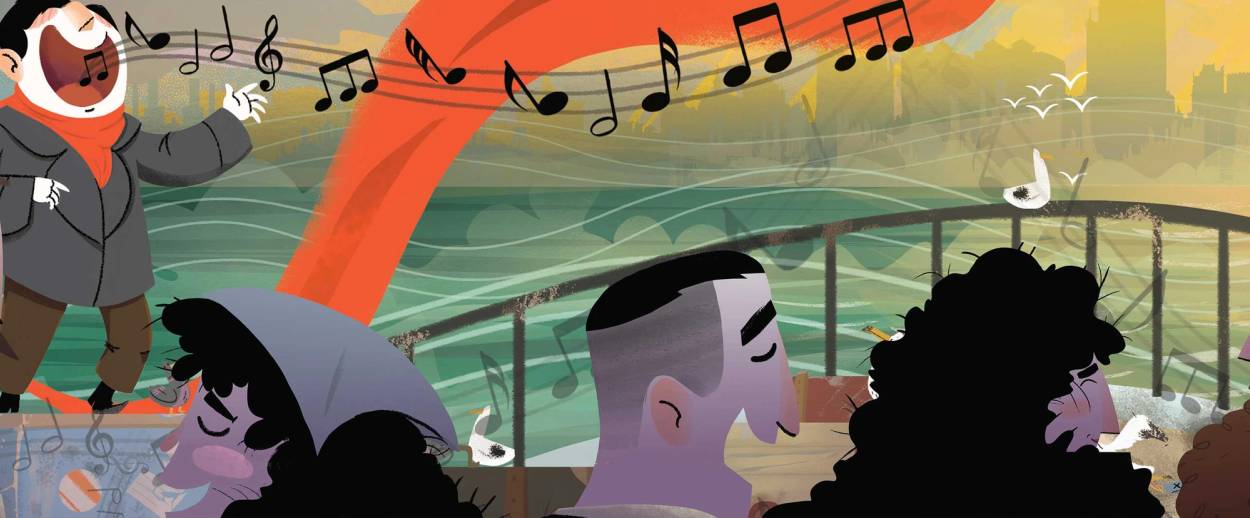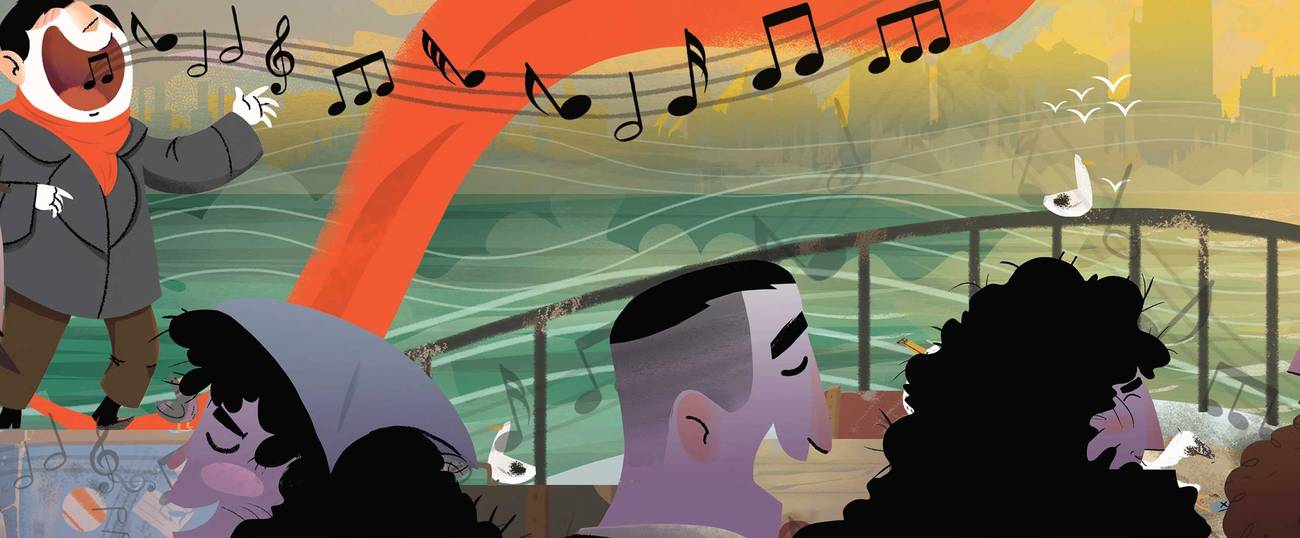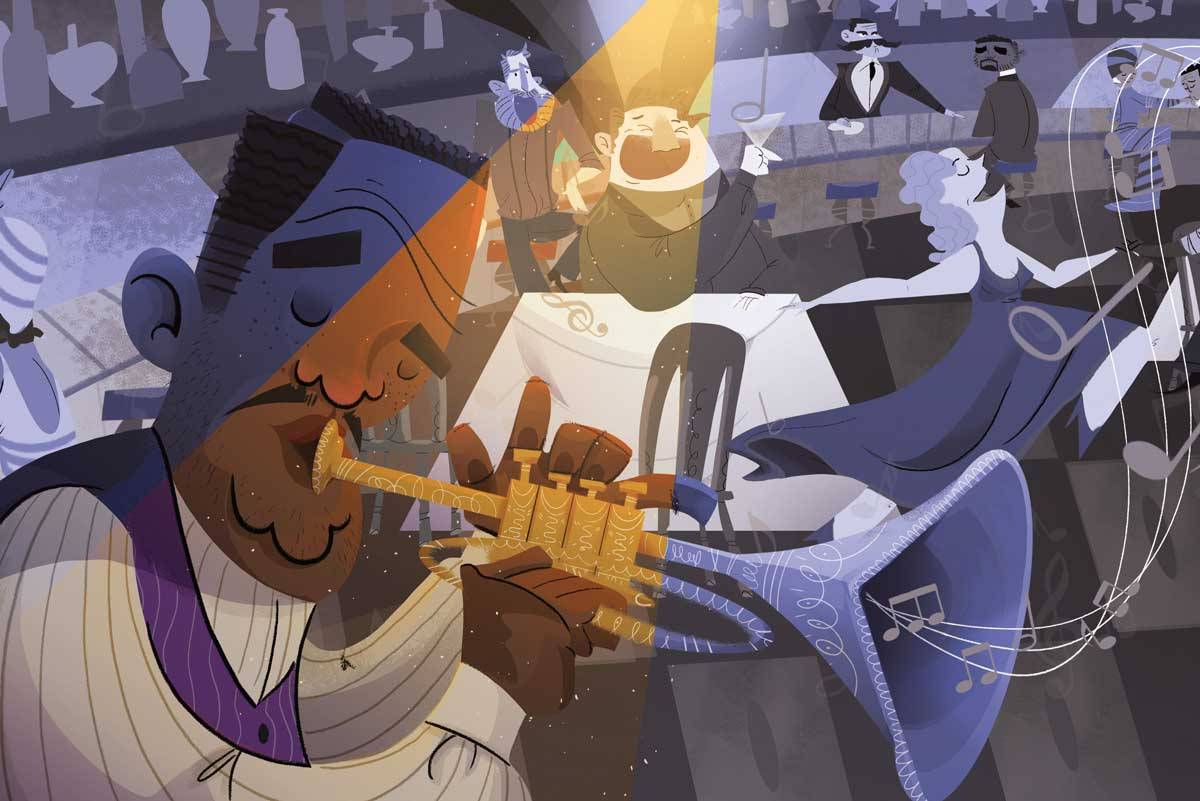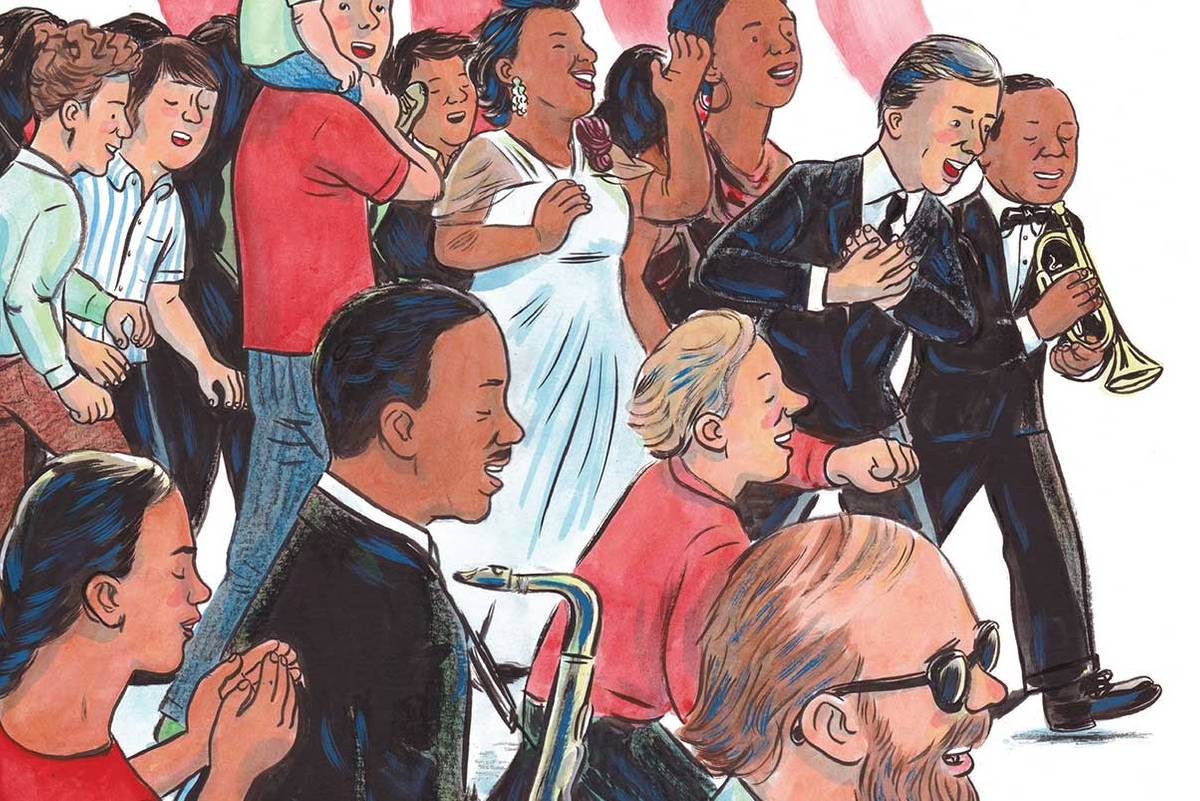Irving Berlin for Kids
A century after ‘God Bless America,’ three picture books celebrate the composer




This year marks the 100th anniversary of the song “God Bless America.” To celebrate, there are three new picture books about its creator, Irving Berlin. Spoiler alert: I like them all!
Each book shares the same, bare biographical outline. Little Izzy Baline and his family fled persecution in Russia to come to New York City. Izzy’s father, a cantor, had a hard time supporting his family in this strange new land. When Izzy was 13, his father died; Izzy moved out to make his own way on the Bowery. At first, he made money singing on the street for pennies; eventually he found work as a singing waiter. He started writing songs, even though he couldn’t read or write music, and got a job working for a music publisher in Tin Pan Alley (where Tablet is today), and became “Irving Berlin.” During World War I, he was drafted into the army, where he wrote songs and musicals to keep the troops entertained. (They were especially amused by the autobiographical “Oh! How I Hate to Get Up in the Morning.”) Berlin churned out monster hit after monster hit (from “Alexander’s Ragtime Band” to “Always” to “Anything You Can Do, I Can Do Better” to “Blue Skies” to “Cheek to Cheek” to “Puttin’ on the Ritz”) though none of the books delve into his catalog, preferring to emphasize his inspiring story. Forever grateful to the country that made his success possible, Berlin published “God Bless America” during World War II, to uplift his beloved adopted country. He never made a penny from it, donating all the royalties to the Boy Scouts and Girl Scouts in perpetuity.
*
If your interest is in stylish art, your first purchase of the three books should be Irving Berlin: The Immigrant Boy Who Made America Sing by Nancy Churnin, illustrated by James Rey Sanchez. Sanchez’s snazzy, jazzy work is sharp and angular, with a little bit of a midcentury Shag vibe. Irving Berlin is punctuated by Irving’s long red scarf, flowing like the Hudson River and swirling like a melody through the pages, past the Katz’s deli sign, down narrow alleys, through restaurants, across a snowy Battery Park. The book itself, like a scarf, is elongated and narrow, adding to the hipster feel. The text is the most poetic, occasionally self-consciously so. As the ship bearing the Baline family pulls into New York Harbor and everyone spots the Statue of Liberty, Churnin writes, “The passengers whispered, then a melody rose and flew to her like Noah’s dove in search of safe land: Shema Yisroel—Hear, O Israel. Irving’s heart lifted and soared.… One day, Irving promised himself, I am going to write a song just for her.” (I’d like to think this is true, since children are literal creatures and I get agita about writers taking liberties in biographies for children, but I have no clue.) The book circles back to note that the song “God Bless America” ended with “three notes from the Shema, as he remembered hearing them on the boat, coming to America, long ago, when the Statue had smiled at his prayer.” It took me a few moments to figure it out: “Adonai Echad” has turned into “my home sweet home.” Lovely.

Write On, Irving Berlin!by Leslie Kimmelman, illustrated by David C. Gardner, is the warmest and most welcoming of the three books. It’s got the biggest trim size, making it the most lap-friendly and classroom-storytime-friendly. Leslie Kimmelman, author of Tablet faves The Little Red Hen and the Passover Matzah and Sam and Charlie (and Sam Too!), is a terrific storyteller, with a deceptively simple style. Her version begins: “Israel Isidore Baline was born in 1888, in Russia. It was a bad time and place to be Jewish. Gangs of angry men rode from village to village in pogroms, destroying Jewish homes and hurting the people who lived in them. Israel’s house was burned down right in front of his eyes.” She doesn’t shy away from the scary stuff; her book is the only one that mentions Berlin’s first wife, Dorothy, who died a few months after their wedding. She’s also the only author who mentions in the text itself, rather than in an afterword, that when Berlin volunteered to return to service in WWII, he insisted that his shows be integrated. She writes, “[B]lack and white soldiers lived, ate and traveled together, which was rare in those days. They refused to stay or play anywhere that didn’t welcome ALL of them. Irving was ahead of the times. The U.S. Armed Forces didn’t integrate until a few years after the war.”
Gardner’s friendly looking illustrations are rendered in soft, nostalgic pastels, sweet without being cloying. Varied type sizes, typefaces, spacing, and type colors keep things interesting and syncopated-feeling.
Irving wrote and wrote and wrote and wrote. He wrote music
For plays, for movies, for friends, for strangers.
He scribbled ideas on napkins and on the sleeves of his shirt.
He wrote songs in elevators and in taxicabs.
He wrote songs in the bathtub.
He wrote all night long.
These words are accompanied by a funny illustration of Irving in the bathtub, a wooden board over his lap (thank goodness) holding a coffee cup and a stack of paper and pencils. He’s smiling to himself, conducting a winding ribbon of music in the air with his finger. Look closely at the paper on the board and you’ll see that he’s begun writing the lyrics to “Blue Skies.” Already tossed onto the bathroom floor are “Puttin’ on the Ritz” and “Easter Parade.” I like that Kimmelman conveys Irving’s confidence in himself (“He told a friend, ‘Not only is ‘White Christmas’ the best song I ever wrote, it’s the best song anybody ever wrote”), and that her afterword contains a list of her favorite Irving Berlin songs.

God Bless America: The Story of an Immigrant Named Irving Berlin by Adah Nuchi, illustrated by Rob Polivka, comes out June 5. The author’s and illustrator’s respective dedications are both pointed: “To my parents, who immigrated” and “For the immigrants whose songs we were not blessed to hear.” Lest you worry that this book is a polemic, rest assured that it’s the one that has the most fun with sound and rhythm. It’s full of lively onomatopoeia:
He took the oath to become a citizen,
And with his country at war,
Irving joined the
cloppity-clop-thwack
march, tramp, pow
rhythms of the United States Army.
Later, when Berlin is trying to figure out how to raise the country’s spirits, Nuchi writes:
Irving Berlin needed
A boom-rah-rah song.
A big brass belter.
A loud heart melter.
A song for America.
God Bless America is the only book that notes that Berlin became a citizen specifically to serve in WWI, and it’s the book that spends the most time discussing the prejudice Irving faced in America.
And while some people didn’t like that
the voice of America belonged to an immigrant
and a Jew, most people felt that a refugee
was just the right person to celebrate
the hope America held.
Nuchi’s text feels economical and tight; the story flows beautifully. The fact that she glides right over the sad parts of Berlin’s life may be comforting to some parents; as with Churnin’s book, though, I worry that truth might be getting sacrificed to narrative. Nuchi cheerily jumps from Irving’s father’s death to Irving’s songwriting success in two paragraphs:
But when Izzy’s father died
and they had even less,
it was time to see what else America could bring.
Out on his own, Izzy
zipped up the Bowery. He didn’t stop singing
until he hit a street bursting with music publishers.
In Tin Pan Alley,
everything rang!
Music clanged out of windows
and tinkled through the air,
black and white notes danced off the presses,
and Izzy cranked out tune after tune after tune.
It’s zippy—but Berlin was 13 when he left home and 19 when he published his first song. Why not let kids see that Irving’s success wasn’t instantaneous, that he sorrowed and struggled just as they do?
Polivka’s buoyant art is a match for the upbeat text—it’s lively, busy, and cartoon-y. There’s so much to look at—so many faces and cars in action, so much fashion and signage. It’s as busy as New York City. Kids will be enthralled. Polivka also shows us who Berlin was writing for: people handwashing dishes, attending ball games, plowing fields, gathered in their living rooms listening anxiously to wooden cathedral-style radios. There are many more brown faces in this book than in the others, and we see struggling Dust Bowl families juxtaposed with glamorously dressed Broadway showgoers. I also give points to Polivka for resisting the urge to fill the page with musical staffs and notes as a shorthand decorative motif; Berlin never did learn to read or write music, and composed only on the black notes, in F sharp; he had special pianos built that transposed to different keys when he pulled a lever.

All three of these books have their strengths and pleasures. And I’m delighted that unlike some other picture book bios, they don’t give Berlin’s Jewishness short shrift. Can I tell you to come on along, let me take you by the hand, and tell you which one to buy? I cannot! Perhaps this summer, when we’re having a heatwave, a tropical heatwave, you’ll want to retreat to the air conditioning with your kids, read all three, dial up the ol’ YouTube and have an Irving Berlin dance party in your living room. Yes you can, yes you can, yes you can.
***
Like this article? Sign up for our Daily Digest to get Tablet Magazine’s new content in your inbox each morning.
Marjorie Ingall is a former columnist for Tablet, the author of Mamaleh Knows Best, and a frequent contributor to the New York Times Book Review.